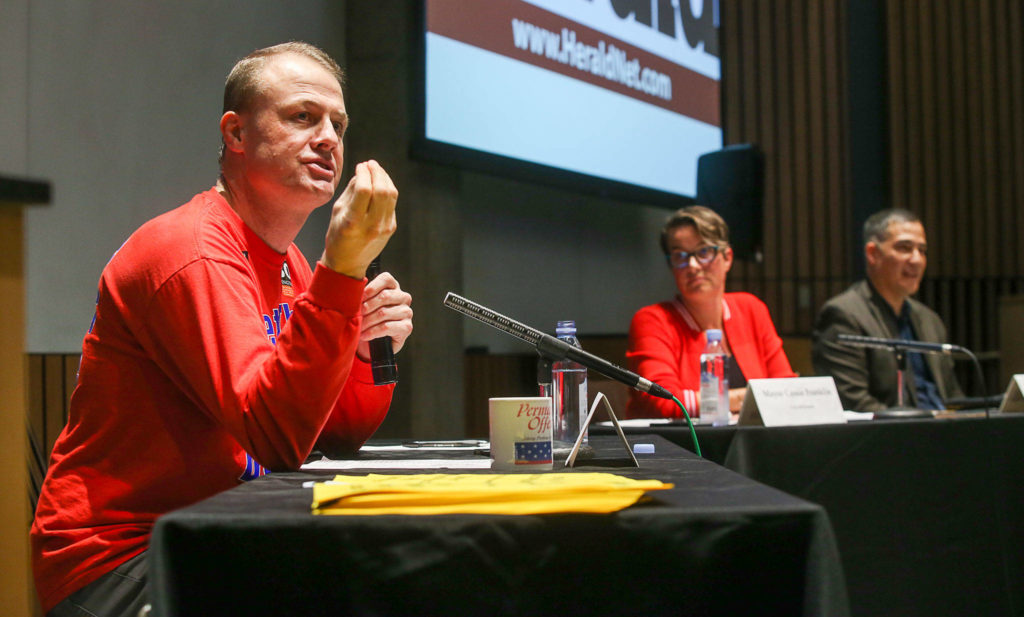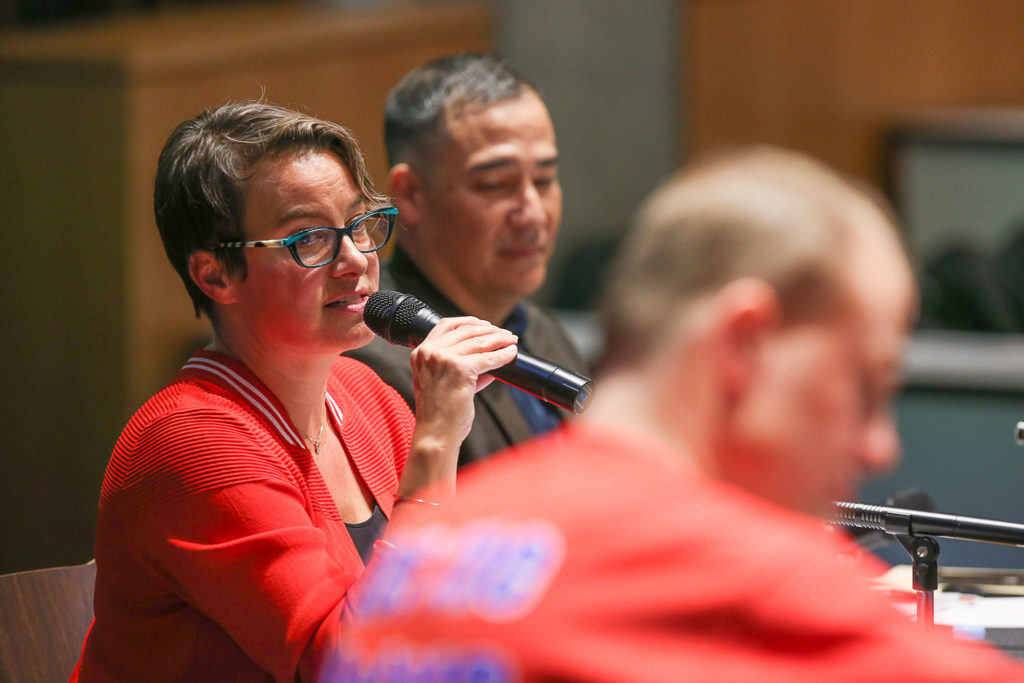EVERETT — In a sometimes-heated debate Thursday night, anti-tax activist Tim Eyman squared off with Everett’s mayor and a state senator over Initiative 976, which would reduce car tab fees to $30 for most vehicles.
The measure on the Nov. 5 ballot would lower the annual vehicle registration fee while stripping the state, cities and transit agencies of a key source of funding.
Initiative sponsor Eyman faced Everett Mayor Cassie Franklin and state Sen. Steve Hobbs, D-Lake Stevens, at a forum moderated by Daily Herald opinion editor Jon Bauer and political reporter Jerry Cornfield. About 100 people attended the event at Washington State University’s North Puget Sound campus in Everett, and the event was broadcast live by TVW.
Honesty was a prevalent theme for both sides as they sparred over Sound Transit and state transportation funding.
“Taxing a $10,000 vehicle as if it’s worth $25,000 is dishonest,” Eyman said, referring to vehicle valuation formulas that drive some car-tab fees. “Our initiative actually gives voters a chance to get rid of this dishonest tax.”
Franklin and Hobbs returned time and again to the argument that voters have already spoken by approving the Sound Transit 3 mass-transit package in 2016.
“Seven hundred thousand people decided in 2016 to invest in transportation infrastructure,” Hobbs said. “It was decided by the voters.”
A near tripling of the vehicle excise tax rate approved in 2016 to fund light rail expansion more commonly known as ST3 was the catalyst for this year’s ballot fight. Initiative backers think the transit agency should switch to a depreciation schedule that more accurately calibrates a vehicle’s worth.
If I-976 passes, there would be impacts beyond Sound Transit. It would eliminate $58.2 million in transportation benefit district license fees from local budgets across the state. Many Snohomish County cities rely on for a large chuck of money to maintain roads.
Hobbs, who is chairman of the Senate Transportation Committee, said the potential loss of revenue keeps him up at night. He acknowledged he has not developed a plan for how to proceed should I-976 pass. To start, he said, the fair thing to do would probably be to look at cuts across the board.
Having to reevaluate state transportation spending might not be a bad thing, Eyman said. “Every single program that is currently funded by this dishonest tax is going to have to justify their very existence, their effectiveness. This is essentially a performance audit.”
In Everett, the city could lose out on $1.5 million, which makes up about half of the pavement maintenance budget, a loss Franklin said would be “devastating.” With the city facing up to a $20 million budget deficit, that gap would remain unfilled, Franklin said.
“If we can’t invest in maintenance, the roads will deteriorate — it will lead to potholes and a much more expensive rebuild of that road,” Franklin said. “This initiative takes away our opportunity to use local transportation dollars to solve local transportation problems.”
The cost to Everett wouldn’t end with maintenance. I-976 would affect the Everett Transit budget and put light rail, set to arrive in 2036, in jeopardy, Franklin said.
A fiscal analysis prepared by the state Office of Financial Management predicts the initiative would drain $475 million from transportation and transit accounts in the next two-year budget.
“Projects will not go forward, some bridges will not be maintained, transit will be cut and these are huge problems across the state,” said Hobbs.
Eyman argued the state could use a current budget surplus to pay for transportation projects, which Hobbs disputed.
The only agreement of the night was the need to revamp the vehicle valuation system used by Sound Transit to determine license renewal fees.
“It needs to be fixed, but you can’t gut our transportation system in the meantime,” Franklin said.
This isn’t the first time voters have had the chance to reduce car tab fees. Similar measures passed in 1999 and 2002. And I-976 wouldn’t preclude the cost of car tabs rising again. Any new fees — from the state, a local government or Sound Transit — would require approval by voters.
Lizz Giordano: 425-374-4165; egiordano@heraldnet.com; Twitter: @lizzgior.
Talk to us
> Give us your news tips.
> Send us a letter to the editor.
> More Herald contact information.


























